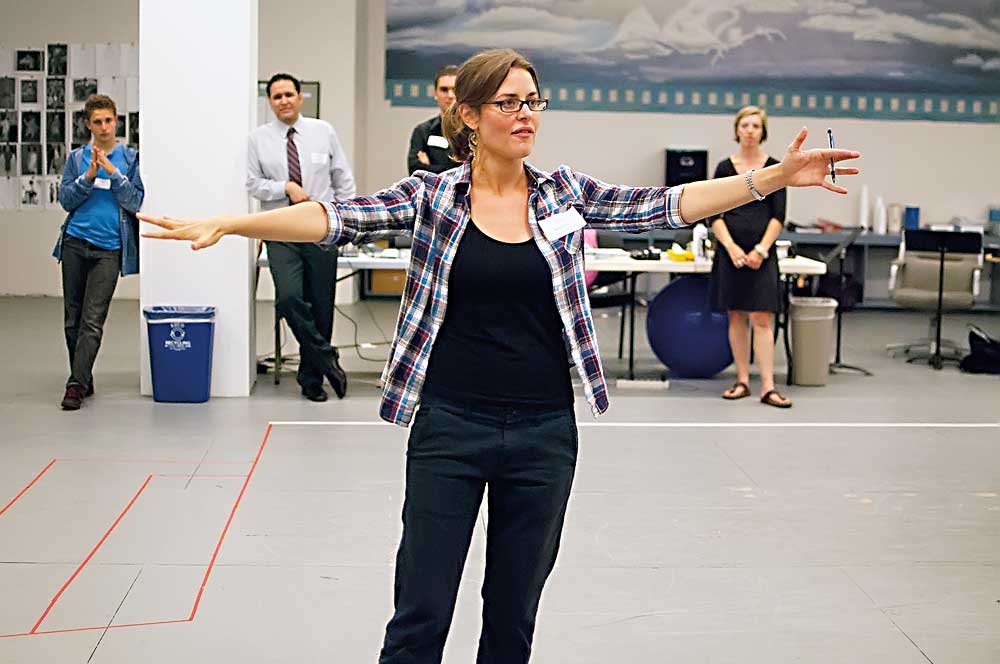DALLAS: The Meadows School of the Arts at Southern Methodist University has announced the recipients of its sixth annual Meadows Prize arts residency: the Detroit-based artist collective Complex Movements and Lear deBessonet, the director of the Public Theater’s Public Works program in New York City. The Meadows Prize is awarded to pioneering artists and creative professionals who are active in one or more disciplines represented by the academic units within the Meadows School.
Complex Movements develops interactive performance work that sets out to illuminate connections between complex science and social justice movements to support the transformation of communities. The troupe is comprised of graphic designer/fine artist Wesley Taylor; music producer/filmmaker Waajeed; lyricist/organizer Invincible; and multimedia artist/performance systems architect Carlos Garcia. Their work draws on multiple disciplines, including community organizing, design, music, architecture, storytelling, multimedia art and theatre. For their Meadows Prize project, Complex Movements will collaborate with the Dallas community and Meadows School on a week-long residency in February, and return in October for a four-week engagement of Beware of the Dandelions—a performance-based installation that will also function as a workshop space and a visual arts exhibition—in Dallas’s Fair Park.

As director of Public Works, deBessonet works with community partner organizations in all areas of New York to participate in theater workshops, attend classes and productions and become involved in the daily life of the Public. Under deBessonet’s leadership, Public Works deliberately blurs the line between professional artists and community members, creating theater that is by and of the people. For her Meadows Prize project, deBessonet will spearhead a new coproduction between the Meadows School and the Dallas Theater Center of The Tempest, to be developed for spring 2017. Lear’s first visit to Dallas will be spring 2015. This coproduction marks a new form and scale for a Meadows Prize project, engaging hundreds of volunteers, community partners from across Dallas and the institutional collaboration and alignment between SMU, the Public Theater and the Dallas Theater Center. DeBessonet’s first iteration of The Tempest was a 2013 Public Works production, in conjunction with a number of community organizations, featuring more than 200 New Yorkers on stage, many with little or no acting experience.
“We’re very excited to welcome Complex Movements and Lear deBessonet to the Meadows School as our sixth-year recipients of the Meadows Prize,” said Sam Holland, dean of the Meadows School of the Arts, in a statement. “Both help us advance important elements of the vision for the Meadows School – to allow our students to interact with artists at the top of their fields and to integrate the Meadows School more deeply into our community.”
The Meadows Prize is part of the Meadows School’s work in art and urbanism, led by Clyde Valentín, former executive director of the New York City-based Hip-Hop Theater Festival. The purpose of this new initiative is to create and build programs that combine the arts and community engagement in Dallas, allowing students and others to immerse themselves in the city and engage with community members and arts institutions to create art collaboratively. The goal is to encourage people to create a cultural energy that supports Dallas—home to the nation’s largest urban arts district—and its growth as a nationally recognized arts center.
“Through their grassroots, community-based and interdisciplinary nature, the projects proposed by Complex Movements and Lear deBessonet perfectly reflect the distinctive values of the Meadows School’s initiatives in arts and urbanism,” said Valentín. “Both projects are unwavering in their commitment to community and to fostering access and equity to art making, while also redefining the use of space as creative place-making.”
Inaugurated in October 2009, the Meadows Prize is presented annually to up to two pioneering artists. It includes support for a residency in Dallas, in addition to a $25,000 stipend. In return, recipients are expected to interact in a substantive way with Meadows students and collaborating arts organizations, and to leave a lasting legacy in Dallas, such as a work of art that remains in the community, a composition or piece of dramatic writing that would be performed locally, or a new way of teaching in a particular discipline.


